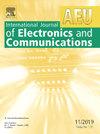Simple power-efficient preamplifier-shaper channel for readout interface of silicon detectors
IF 3
3区 计算机科学
Q2 ENGINEERING, ELECTRICAL & ELECTRONIC
Aeu-International Journal of Electronics and Communications
Pub Date : 2024-11-07
DOI:10.1016/j.aeue.2024.155577
引用次数: 0
Abstract
This paper presents the design and characteristics of a front-end readout system for silicon sensors used in nuclear spectroscopy studies. Furthermore, the study proposes circuit topologies that combine gain-boosting and class-AB techniques featuring a good performance regarding gain, accuracy, speed, linearity, and power consumption, meeting the stringent requirements of deep submicrometer CMOS technologies. The readout channel comprises a charge-sensitive amplifier with a tunable discharge time, pole-zero cancellation circuit, and first-order unipolar shaper with a peaking time of 90 ns. The building blocks are made up of single-stage op-amps, thus not requiring compensation. Furthermore, the circuit is optimized for a detector capacitance of 5 pF, and the noise performance is discussed. Experimental results in a 180 nm CMOS process and a supply voltage of ±0.9 V validate the designed front-end channel. The total area of the chip obtained was 0.028 mm2. The conversion gain was 3.1 mV/fC, and the system maintained linearity up to an input charge range of 150 fC with a maximum output swing of 460 mV and recovered to the baseline within 400 ns. The compact design and the power consumption of only 1.97 mW provided a feasible solution for current radiation detectors coupled to many highly dense electronic channels.
用于硅探测器读出接口的简单省电前置放大器-整形器通道
本文介绍了用于核光谱研究的硅传感器前端读出系统的设计和特点。此外,该研究还提出了结合增益提升和 AB 类技术的电路拓扑结构,在增益、精度、速度、线性度和功耗方面具有良好的性能,满足深亚微米 CMOS 技术的严格要求。读出通道包括一个具有可调放电时间的电荷敏感放大器、极零消除电路和峰值时间为 90 ns 的一阶单极整形器。这些构件由单级运算放大器组成,因此无需补偿。此外,还针对 5 pF 的检测器电容对电路进行了优化,并对噪声性能进行了讨论。180 纳米 CMOS 工艺和 ±0.9 V 电源电压下的实验结果验证了所设计的前端通道。获得的芯片总面积为 0.028 mm2。转换增益为 3.1 mV/fC,系统在 150 fC 的输入电荷范围内保持线性,最大输出摆幅为 460 mV,并在 400 ns 内恢复到基线。该系统设计紧凑,功耗仅为 1.97 mW,为当前与许多高密度电子通道耦合的辐射探测器提供了可行的解决方案。
本文章由计算机程序翻译,如有差异,请以英文原文为准。
求助全文
约1分钟内获得全文
求助全文
来源期刊
CiteScore
6.90
自引率
18.80%
发文量
292
审稿时长
4.9 months
期刊介绍:
AEÜ is an international scientific journal which publishes both original works and invited tutorials. The journal''s scope covers all aspects of theory and design of circuits, systems and devices for electronics, signal processing, and communication, including:
signal and system theory, digital signal processing
network theory and circuit design
information theory, communication theory and techniques, modulation, source and channel coding
switching theory and techniques, communication protocols
optical communications
microwave theory and techniques, radar, sonar
antennas, wave propagation
AEÜ publishes full papers and letters with very short turn around time but a high standard review process. Review cycles are typically finished within twelve weeks by application of modern electronic communication facilities.

 求助内容:
求助内容: 应助结果提醒方式:
应助结果提醒方式:


